Software Development for Startups: Complete Guide [2026 Edition]

Bringing a new product to life is exciting, but for many founders, software development for startups feels overwhelming, especially with limited time, budget, or tech knowledge. This MOR Software’s guide breaks down the entire process, showing how custom software development for startups can be faster, smarter, and more achievable than you think.
What Makes Software Development For Startups Unique?
Startups move fast. They don’t have long chains of approvals or departments slowing things down. Founders and small teams call the shots, make decisions quickly, and shift gears based on what early users say.
McKinsey estimates the global SaaS market hit roughly $3 trillion in 2022. This shows the vast upside available to young companies that iterate quickly. That’s why software development for startups has its own tempo, different from what you'd find in big corporations.
It’s not about building once and waiting. Startups rely on frequent iterations. Teams launch, test, tweak, and relaunch, sometimes in a matter of days. This rhythm of rapid prototyping means engineers need to be ready to push updates regularly and react to what users actually do, not just what they say.
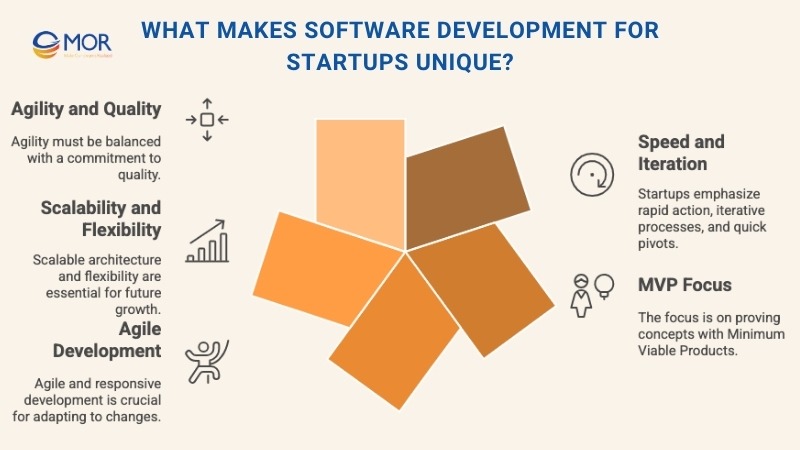
Forbes reminds us that around 90 % of startups never reach maturity, so speed alone is not a guarantee of survival.
Early on, most startups race to get a Minimum Viable Product (MVP) out the door. That MVP doesn’t need to be perfect, but it needs to prove the idea. Still, the real goal isn’t just a quick launch. It’s building something that can grow. That’s where things like scalable architecture, smart cloud infrastructure, and a stable tech stack come into play.
That’s also where agility matters. Software development for startups depends on being responsive. One new customer segment, one user complaint, one investor ask, any of those can change priorities overnight. So your team needs to stay light, flexible, and focused on building a product that keeps up with the business.
What approach works best in this kind of setting? Keep reading as we break down the top methodologies that help early-stage companies build quickly, learn fast, and grow with confidence.
Popular Methodologies In Software Development For Startups
Some methods just fit better when you're moving fast and building something new. The most popular software development for startups approaches include Lean, Scrum, Kanban, and Feature-Driven Development (FDD). Each follows core Agile values:
- People first, tools second
- Working product over thick documentation
- Partners over contracts
- Flexibility over fixed plans
Below we’ll break down what makes each approach useful for a growing team.
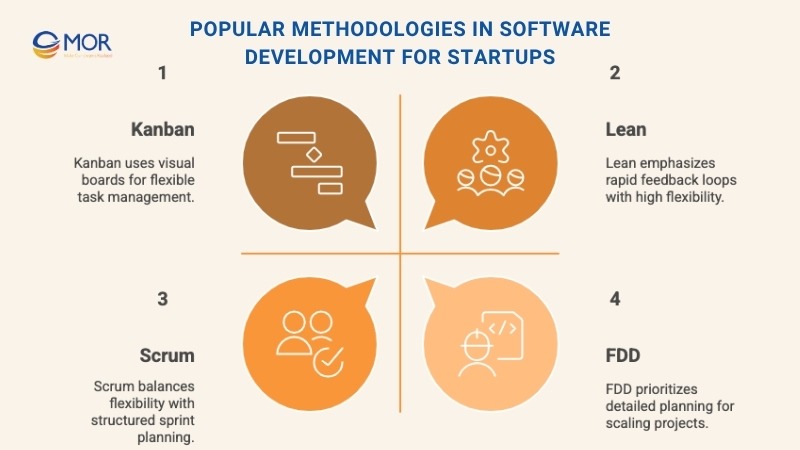
Lean
Lean is all about learning fast. It follows the Build–Measure–Learn loop, where you test ideas quickly and tweak based on real user feedback. Teams don’t waste time building extras, they stay focused on what matters most right now.
What stands out:
- Fast feedback loops from early adopters
- Quick dev cycles, often just days
- Rollouts based on real-time learning
This method fits teams still finding product-market fit or testing bold ideas on limited budgets. It’s also a great base for custom software development for startups, where each release is shaped by user input.
Nielsen data shows that Black adults in the US spend about 23 hours and 26 minutes per week inside smartphone apps, nearly two hours more than the national average. This proves how quickly engaged users surface feedback for teams that ship often.
Scrum
Scrum splits work into short time-boxed sprints. Everyone, from developers to designers, knows what the sprint goal is. You plan at the start, check in daily, and deliver working pieces by the end.
What stands out:
- Sprints typically run 2–4 weeks
- Daily standups keep everyone aligned
- Builds momentum with frequent product drops
Scrum works well when your startup has a stable vision but needs speed and structure. It’s widely used in startup software development companies with cross-functional teams working remotely.
Kanban
Kanban uses boards (digital or physical) to track tasks visually. There’s no set sprint length. Instead, the focus is on limiting how many tasks are ‘in progress’ at once to avoid overload.
What stands out:
- Task flow is clear and visible
- No strict time cycles
- Prioritizes task completion over volume
Kanban is a great fit if you’re juggling shifting priorities, especially when you’ve outsourced parts of the build. Many outsourcing software development for startups providers rely on Kanban to improve collaboration across time zones.
Feature-Driven Development (FDD)
FDD is best when you already have a working product and a clear roadmap of features. It starts with planning and modeling, then rolls out those features step-by-step.
What stands out:
- Every step centers on a specific feature
- Heavy on planning upfront
- Consistent deliveries over time
FDD helps with scaling. It works well when you’ve validated your MVP and are moving toward structured releases with a remote or hybrid team setup.
No one approach fits all. Most startups mix methods, using Kanban for design, Scrum for development, and Lean for early feature testing. Pick the mix that matches your team’s rhythm and your product’s needs. That’s how real development startups stay agile and ship fast.
MVP Vs Full Product In Software Development For Startups
If you're heading into investor talks or applying to a top startup accelerator, you’ll need more than just an idea on paper. At the very least, they’ll expect a real, usable MVP.
In some cases, you’ll need a fully launched product with paying users. Whether you're early or further along, it’s important to know what separates building a solid MVP from delivering a complete system.
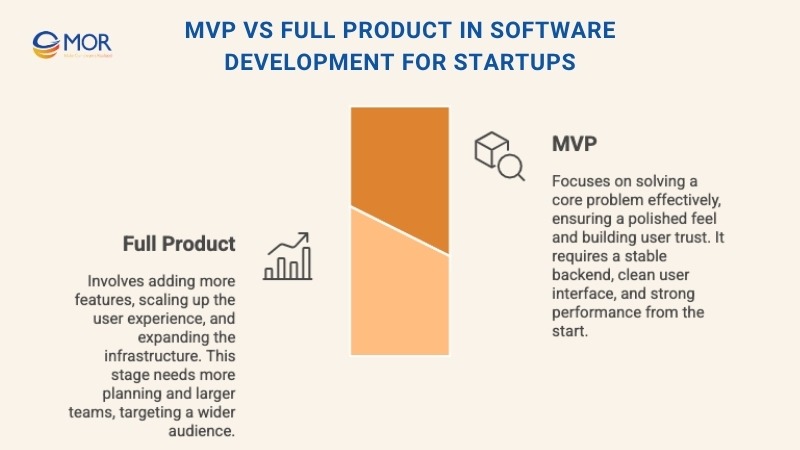
Building An MVP
The old view of an MVP was a half-finished app or a simple prototype. That’s changed. Now, startup MVP development needs to show actual value, solve a specific problem, and prove your concept in the market. This is where real software development for startups begins.
To stand out, your MVP must include:
- Key features that solve one sharp problem
- A UI/UX that feels polished and intuitive
- A secure backend to protect user data
- Clean code with stable performance from day one
Cutting corners here isn't smart. If your core feature doesn’t work, people won’t come back. If your app feels clunky or looks outdated, they won’t even stick around long enough to try it. And if users find bugs, security gaps, or slow load times, you’re risking the one thing you can’t afford to lose early on, trust.
This is why custom software startup projects often put heavy focus on infrastructure, code quality, and design. A great MVP makes a strong first impression. Miss that shot, and your second chance might never come.
TechCrunch notes the median US seed round in early 2024 was roughly $3.1 million with a $12 million pre‑money valuation, so every feature you demo must justify capital at that scale.
Launching A Full-Scale Product
Once your MVP has proven the idea, it’s time to think bigger. A full-scale product isn’t just an improved version of the MVP, it’s a different kind of build altogether. It’s what happens when software development for startups shifts focus from quick validation to long-term growth.
Full-scale development means:
- A wider range of features, often built in layers
- A refined, intuitive user experience across all flows
- Scalable architecture built for high traffic and future growth
- Longer sprints, more team members, and heavier planning
The product has to do more, look better, and run smoother at scale. It’s not just about solving one problem anymore, it’s about becoming a go-to solution for a broader audience. While the MVP might serve a small user base, full product builds target growing customer segments and business partnerships.
That also means higher costs, longer timelines, and deeper commitment from your team. For many founders, this is when they bring in a software development company for startups to manage increased technical complexity and expand faster without losing quality.
Bloomberg reports global venture investment fell about 30% in Q1 2024, so polished full‑scale releases matter more than ever when competing for a shrinking pool of capital.
Software Development For Startups: Build In-House Vs Outsource
Your team size, budget, and product complexity will shape how you build. When it comes to software development for startups, the choice often comes down to hiring an in-house team or working with an outside partner.
Each path has trade-offs. Let’s break them down.
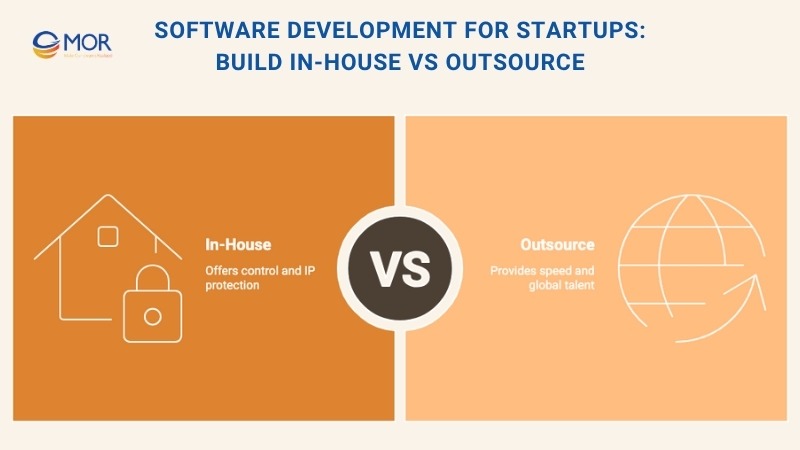
In-House Development
Bringing developers in-house gives you tighter control. You can walk over and discuss ideas, shape the product daily, and build a long-term team culture. This setup works well when you’re building something deeply technical, especially if it involves patented tech, machine learning, or complex data logic that needs steady iteration.
But in-house teams come with costs. Recruitment takes time. Salaries, benefits, equipment, and overhead add up quickly. The US Bureau of Labor Statistics lists the median software‑developer salary at about $133,080 per year, roughly $64 per hour, before benefits and overhead.
If you're just starting, that investment might stretch your resources thin before your product hits the market.
Partnering With An Outsourcing Firm
Many early-stage companies turn to outsourcing software development for startups to cover the gaps, whether that’s missing technical skills, tight timelines, or budget limits.
An experienced outsourcing partner can help you:
- Launch quickly without hiring delays
- Access niche expertise that’s hard to find locally
- Stay lean while focusing on core business tasks
And outsourcing isn’t just for early stages. As you scale, you might still need help handling workload spikes or adding features faster. Partnering with the right provider gives you flexibility through each phase of the journey.
When Outsourcing Software Development For Startups Makes Sense
Outsourcing isn’t just about saving money. For many companies, it’s a smart move that helps them move faster, prove their idea, and free up resources. So, when does outsourcing software development for startups make the most sense?
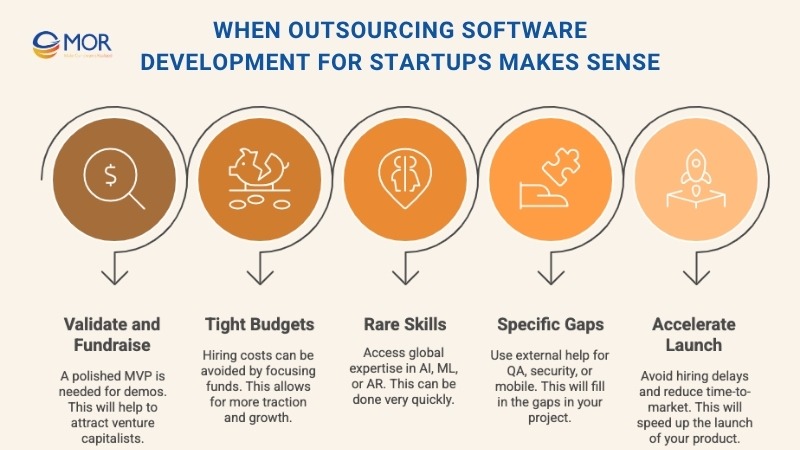
Validate Ideas And Attract Investment
If you’re pitching to investors, showing up with a slide deck isn’t enough. They want proof, real users, working features, and signs of traction. A functioning product, even in early form, shows you’re serious. It gives you leverage in conversations and sets your startup apart.
That’s why many founders turn to startup software development company partners to get a polished MVP out quickly. It's faster than building an in-house team from scratch and helps you test assumptions while preparing for funding rounds.
Limited Budget
Early-stage startups almost always watch costs closely. Building a full team in-house takes time and cash, and that’s before you even start coding. Outsourcing lets you redirect those funds to things like growth marketing or customer research.
The numbers speak for themselves. In the U.S., developers often charge $100–$150 per hour. In places like Eastern Europe or Southeast Asia, rates range from $25–$50. And that’s not counting the HR costs, taxes, and overhead that come with employees.
Smart teams know where their edge is. Spending less on code and more on traction is often a better move when every dollar counts. That's why software development services for startups offered by global firms are becoming more popular, not just for early prototypes but well into later stages.
Rare Technical Expertise
Building modern MVPs often involves emerging tech, think AI, machine learning, or augmented reality. These aren’t plug-and-play skills. They're tough to find and even harder to afford in-house. And as more accelerators push for 'next-gen' innovation, the demand keeps rising.
Programs like Techstars AI or AI2 Incubator focus solely on startups using these advanced tools. That puts pressure on founders to deliver not just ideas, but actual working demos powered by rare technical talent.
Rather than stretching internal teams too thin, many startups partner with vendors that already have that skill set. These firms specialize in custom software development for startups and have engineers ready to plug into your tech stack right away. You save time, avoid costly recruiting cycles, and still get high-level execution.
Temporary Team Extension
You don’t need to outsource everything. Sometimes, it's just about covering gaps. Maybe you’ve built the core product in-house, but you still need help with QA, security audits, or mobile versions. Outsourcing lets you keep your focus where it matters while handing off specific tasks to reliable partners.
This kind of flexible collaboration is common, especially during scale-up stages or peak dev cycles.
Time to Market
Every week counts. Setting up an in-house team with all the needed roles, from backend engineers to UI designers, can take months. That’s time your competitor might use to ship.
By working with experienced partners offering software development companies for startups, you cut that timeline down. They handle sourcing, screening, and onboarding, and bring ready-to-work talent into your project. You get to market faster without sacrificing quality or burning out your internal team.
Most-Used Software Development Services For Startups
Startups don’t always need everything at once, but they do need the right help at the right time. Whether you’re validating an idea, preparing for launch, or scaling your product, a strong software development for startups partner can cover all the bases. Here are the most common services early-stage companies lean on.
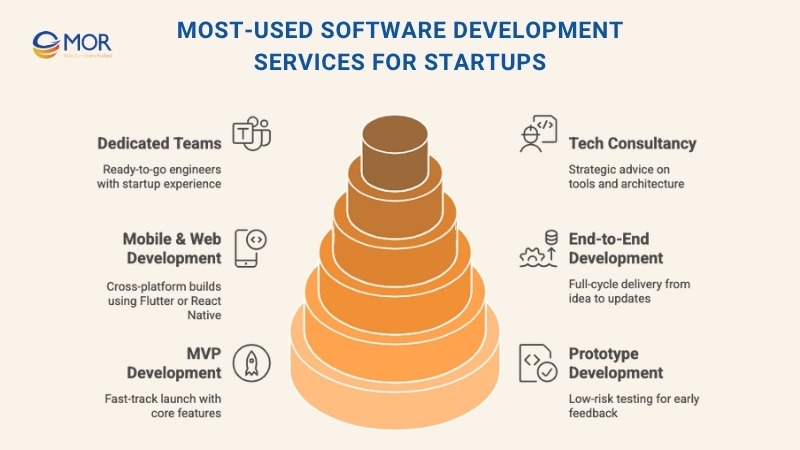
- Proof of Concept and Prototype Development: Before writing full code, it helps to test the idea in a low-risk way. A prototype shows how your concept works. It’s quick to build and gives you something to show investors or users before committing major resources.
- MVP Development: This is where most startups begin. You focus on the key feature set and get a usable product to market fast. It's all about speed and feedback. Many founders rely on software development services for startups here to skip long hiring cycles and get to launch sooner.
- End-to-End Development: Some teams want full support, from idea through release and post-launch updates. That includes design, architecture, front and back-end coding, QA, deployment, and even maintenance. Working with a full-service team helps you stay lean and reduce handoff errors.
- Mobile and Web App Development: Whether you’re building native mobile apps or responsive web platforms, you’ll need developers who know your audience and platform. Today, cross-platform tools like Flutter or React Native also offer efficient ways to cover both iOS and Android at once.
- Tech Consultancy: Sometimes you just need direction. Tech consultants can help you choose the best architecture, frameworks, and hosting model based on your goals. It’s especially useful for non-technical founders who need a clear roadmap from day one.
- Dedicated Development Team: Instead of hiring role by role, startups often opt for a dedicated team from a startup software development company. You get vetted engineers with experience in your industry, working under your schedule and direction, but without long-term hiring commitments.
Each service plays a role depending on where your product is in the journey. The right mix helps you stay focused, ship faster, and avoid technical debt early on.
Tips For Custom Software Development For Startups
Partnering with the right team can make or break your product. If you're planning custom software development for startups, it’s not just about writing code, it’s about building trust, clarity, and long-term success. Here’s what to focus on when choosing a provider.
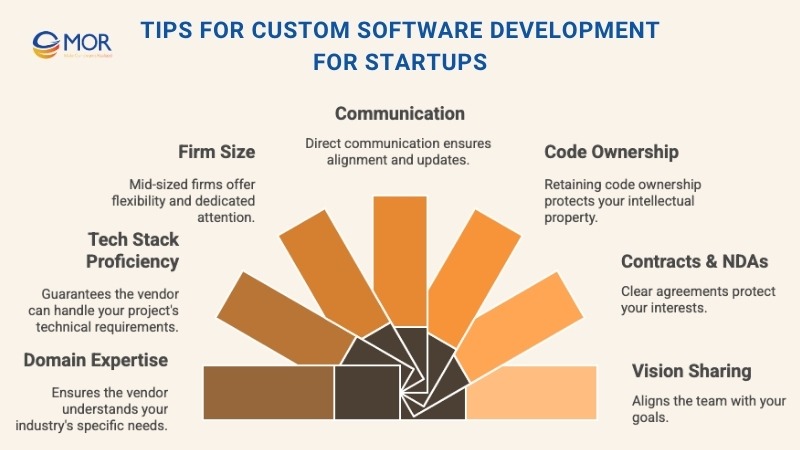
Look For Domain Expertise
If your product targets a niche like finance, healthcare, or retail, don’t settle for generalists. Pick a partner who knows the space. They’ll understand industry-specific needs, tools, and rules like HIPAA or PCI compliance. This saves you from costly missteps later.
Check Technical Expertise
Make sure the team knows the tech your product needs. Ask about their experience with the stack you’ve chosen, whether it’s React, Node.js, Python, or AWS. The best custom software startup partners will show real projects and explain how their tools fit your goals.
Mind The Company Size And Capacity
Mid-size firms (roughly 50–200 people) often strike the right balance. They’re big enough to handle tight timelines and testing but small enough to treat your startup like a priority. You won’t get buried under bigger clients or face constant rescheduling.
Communicate Directly With Your Team
Strong communication keeps things moving. Ask for regular updates, daily standups, or sprint demos. Make sure you have a point of contact who can answer questions and flag issues fast. Clarity now prevents headaches later.
Make Sure You Own The Code
Your codebase should live in your GitHub or GitLab repo, under your account, not the vendor’s. This gives you full control, now and in the future. If you ever switch teams, you won’t have to start from scratch or worry about licensing fights.
Lock Down Contracts And NDA
Be specific in your contract. List out deliverables, timelines, payment terms, and who owns what. An NDA is a must. It protects your idea, your roadmap, and any proprietary tools you’re sharing. Good partners won’t hesitate to sign one.
Share Your Vision And Goals
The best teams don’t just follow specs, they buy into the big picture. Tell them why the product matters, what problem it solves, and who it’s for. When developers understand the mission, they care more, spot risks earlier, and deliver better results.
Even if you outsource, the vision still belongs to you. Keep the direction clear. Use milestone check-ins and feedback loops to stay aligned and build something that truly serves your users. That’s how smart software development for startups stays on course.
Securing Software Development For Startups From Day One
Security isn’t something to bolt on later. It has to be baked in from the start. For any software development for startups, even a minor breach can shake user trust and damage your brand. A 2023 Pew Research Center study found that 81% of Americans believe the risks of companies collecting their data outweigh the benefits. That’s why building secure systems from day one isn’t optional, it’s expected.
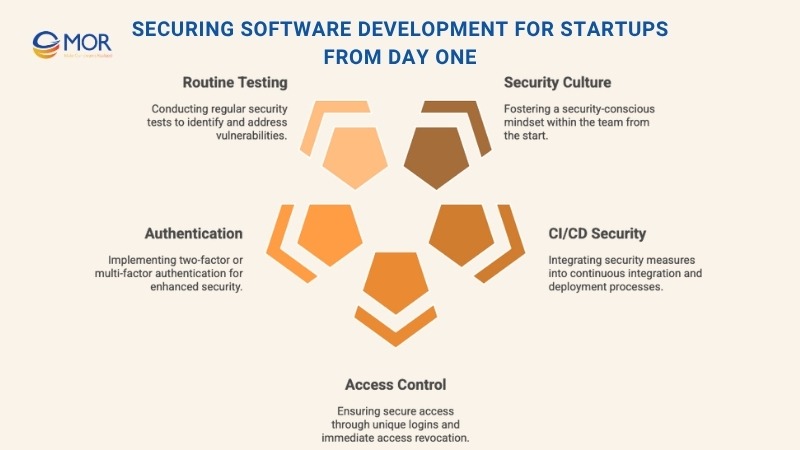
Here’s how to keep your development environment safe and trustworthy from the start.
- Build a Security-First Culture: Start with mindset. Sign NDAs with your team and partners early. Make secure coding and testing part of your daily workflow, not just a final step before launch.
- Set Delivery Protocols That Prevent Gaps: Follow proven methods like CI/CD pipelines, secure version control, peer code reviews, and automated testing. These steps reduce human error and ensure code is checked at every level.
- Lock Down Access With Unique Credentials: Each team member should have their own login and password for every platform and tool. Never share credentials. That includes temporary contractors or remote workers helping with development startups projects.
- Remove Access Immediately When People Leave: Use strict user deactivation policies. The moment someone exits the project, their accounts should be removed. No delays. No loopholes.
- Enable Two-Factor or Multi-Factor Authentication (2FA/MFA): Turn on 2FA or MFA for every admin tool, source code repository, and production environment. This is one of the easiest ways to block unauthorized access, even if a password leaks.
- Run Regular Security Tests: IBM’s 2024 Cost of a Data Breach Report pegs the average incident at $4.88 million, making proactive safeguards far cheaper than a single breach. Make testing a habit, not a one-time task. Regular audits help uncover weak spots before attackers do. Focus on:
- Penetration testing
- Web and app security scans
- API security checks
- Vulnerability management tools
- Static and dynamic analysis (SAST/DAST)
Whether you’re working with an in-house team or a software development company for startups, security should be a shared priority. Build with it in mind from the start, and you’ll save time, money, and reputation later.
The Financial Times notes that 94% of IT leaders reported significant cyber attacks in 2023, a reminder that threats are now routine, not rare.
How MOR Software Makes Your Startup Journey Easier
At MOR Software, we don’t just build software. We build long-term partnerships that help startups grow with confidence. Whether you’re launching an MVP or scaling to full product, we provide flexible, reliable development support tailored to your pace and priorities.
- Agile Teams That Think Like Founders: Our teams take ownership of the outcome, not just the task. We work side-by-side with you to deliver scalable, secure, and user-ready products while helping control long-term development costs.
- Solutions Aligned With Your Business Goals: Every project starts with analysis, not assumptions. We dive into your business model, product vision, and user needs to make sure we’re building the right thing, the right way.
- Clear Communication, Real-Time Tracking: We use tools like Jira, Trello, Confluence, and Slack to keep development transparent. You’ll see sprint progress, feature updates, and bug fixes, nothing gets lost in the shuffle.
- Time Tracking You Can Trust: Our detailed timesheets break down what each team member is doing and when. You’ll always have a clear view of time spent and progress made.
- Built-In Compliance and Data Security: From healthcare to finance, we understand how to build software that meets strict compliance standards. We follow best practices for data privacy and will help ensure your app is aligned with requirements like HIPAA, GDPR, and PCI DSS.
With deep experience in software development for startups, MOR Software helps turn bold ideas into market-ready products, without wasting time or budget.
Conclusion
Successful software development for startups takes more than just writing code. It demands a clear plan, the right team, and a deep understanding of user needs. With a solid foundation and the right tech partner, your product has a real shot at standing out.
MOR Software is here to support that journey. From MVP to full-scale launch, we bring the experience, tools, and mindset to help you build smarter and move faster. Ready to bring your idea to life? Contact us today, we’d love to hear what you’re working on.
MOR SOFTWARE
Frequently Asked Questions (FAQs)
What’s the first step in software development for startups?
Start with clear goals and a product roadmap. Most startups begin with a proof of concept or MVP to test their idea before scaling.
How long does it take to build an MVP?
On average, 2 to 4 months. The timeline depends on complexity, team size, and how quickly you can make decisions.
Is it better to outsource or hire an in-house team?
Outsourcing is faster and more cost-effective early on. In-house teams make more sense once your product is stable and growing.
What tech stack is best for startups?
There’s no one-size-fits-all. The best tech stack depends on your product goals, team expertise, and long-term plans. Common stacks include Node.js, React, Python, and Firebase.
How much does startup software development cost?
It can range from $10,000 for a basic MVP to $100,000+ for a full product. Costs depend on features, complexity, and who builds it.
Rate this article
0
over 5.0 based on 0 reviews
Your rating on this news:
Name
*Email
*Write your comment
*Send your comment
1